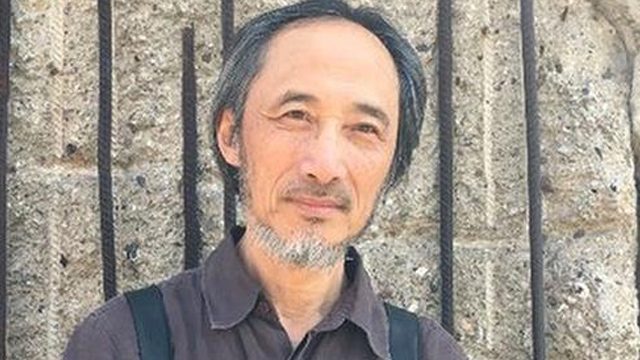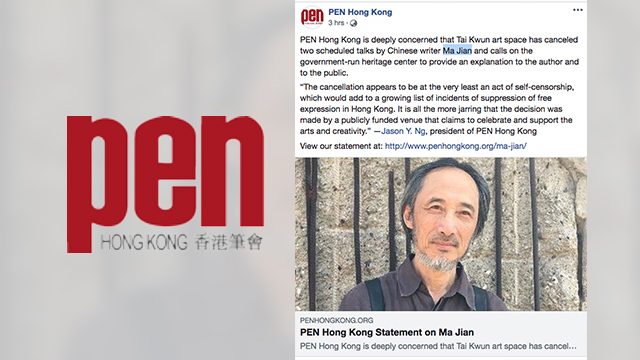SUMMARY
This is AI generated summarization, which may have errors. For context, always refer to the full article.

HONG KONG, China – A Hong Kong arts center hosting the city’s high-profile literary festival has cancelled appearances by exiled Chinese writer Ma Jian, the author said Thursday, November 7, as Beijing tightens its grip on the city.
The Tai Kwun arts center, a major new cultural hub in Hong Kong, pulled the talks because it did not want to become “a platform to promote the political interests of any individual,” director Timothy Calnin said in a statement.
#HongKong art space Tai Kwun says it cannot become a political platform, after cancelling Ma Jian’s @litfest_hk book events: https://t.co/84ekgXpqu8 pic.twitter.com/0jG9LvOYrp
— Hong Kong Free Press (@HongKongFP) November 8, 2018
Rights group Amnesty International said it was more evidence that freedom of expression in Hong Kong was “under attack”.
Critics posting on social media questioned how literature could ever be apolitical and pointed out that other authors hosted by Tai Kwun as part of the festival were discussing political ideas, including the emergence of a #MeToo movement in China.
Ma, who now lives in London, writes dark and satirical works depicting life in China and his books are banned on the mainland.
He was due to promote his latest novel “China Dream” later this week, a title that plays on Chinese President Xi Jinping’s rhetoric of national rejuvenation and is described by publisher Penguin as “a biting satire of totalitarianism”.
The author announced on Twitter that his two speaking events had been cancelled by Tai Kwun, not by festival organizers.
Just been told that my two events at the Hong Kong International Literary Festival this week can no longer be held at Tai Kwun, where all the other events are taking place. An alternative venue will have to be found. No reason has been given to me yet. https://t.co/wqJHs79JkW
— 马建 Ma Jian (@majian53) November 7, 2018
Yes, it is Tai Kwun’s decision to cancel my two events. The Literary Festival are trying to find an alternative venue.
— 马建 Ma Jian (@majian53) November 7, 2018
Hong Kong International Literary Festival said it would not speculate on the reasons for the cancellation and was focusing on finding a new venue.
Amnesty’s China researcher Patrick Poon said there was “a clear pattern” that political debate was increasingly under pressure.
Author Jason Ng, president of PEN Hong Kong, a writers’ NGO which campaigns for freedom of speech, said the cancellation was “at the very least an act of self-censorship” and an example of the suppression of free expression in Hong Kong.

Tai Kwun is the result of a multi-million-dollar renovation of a colonial-era prison and police station, led by the government and the Hong Kong Jockey Club.
Art critic John Batten, who advises on visual arts programming at Tai Kwun, said he was concerned it had “implications for any event” at the center.
“I strongly believe in freedom of expression at Tai Kwun and will be asking about the details of this cancellation,” Batten told AFP.
Arts under attack
Hong Kong has rights unseen on the mainland, protected by an agreement made before the city was handed back to China by Britain in 1997, but there are fears they are being steadily eroded.
A highly anticipated art show by Chinese political cartoonist Badiucao was cancelled last week with Hong Kong organizers citing safety concerns due to “threats made by Chinese authorities relating to the artist”.
Hong Kong authorities also faced a major backlash when they denied a visa without explanation last month to a Financial Times journalist who had chaired a press club talk by a Hong Kong independence activist.
The city’s publishing sector has taken a hit since 5 booksellers known for printing gossipy titles about China’s leaders disappeared in 2015 and resurfaced in custody on the mainland.
Since then some of Hong Kong’s bookshops selling works banned in China have closed and chain stores have removed them from their shelves.
Beijing’s liaison office in Hong Kong has indirect ownership of a local publishing conglomerate that runs more than half the bookshops in the city, according to local media.
Ma Jian said on Twitter last week that for the first time he had been unable to find a Hong Kong publisher for the Chinese language version of his new book.
In neighboring Macau, also a semi-autonomous part of China, 3 writers including bestselling “Wild Swans” author Jung Chang – who has been highly critical of China’s political system – stayed away from the city’s literary festival in March after authorities there said they were likely to be barred.
The Hong Kong literary festival attracts leading authors from around the world and this year features Scottish novelist Irvine Welsh and bestselling American author Cheryl Strayed. – Rappler.com
Add a comment
How does this make you feel?
There are no comments yet. Add your comment to start the conversation.